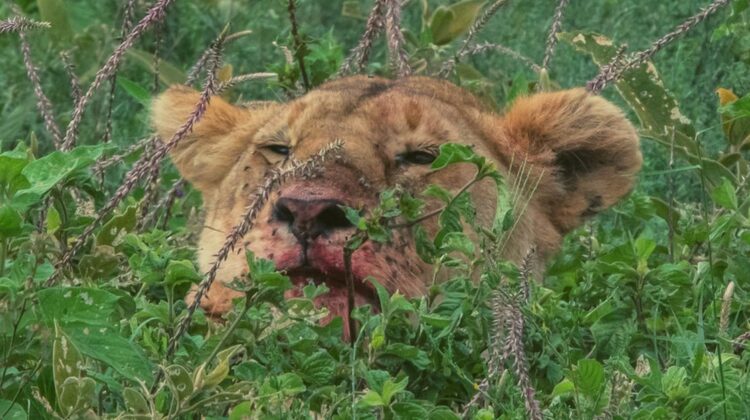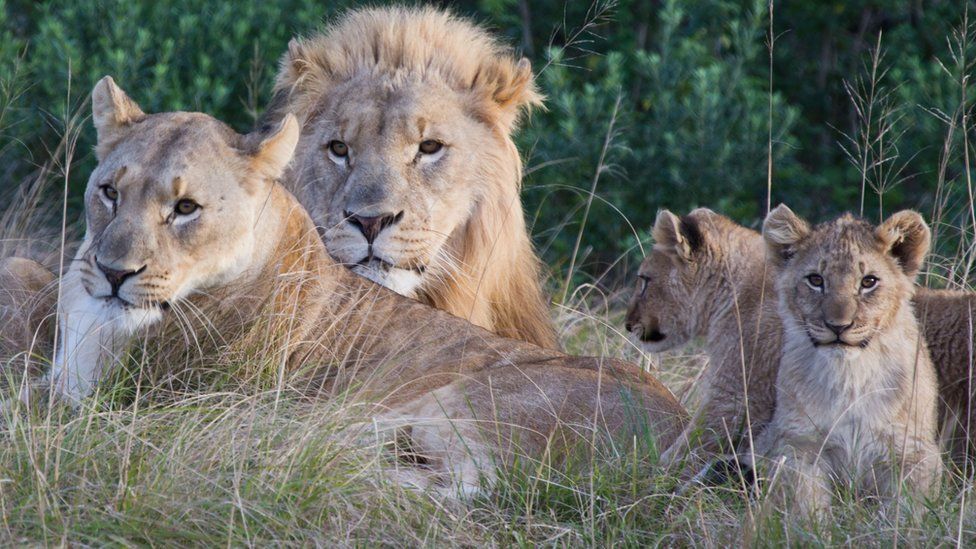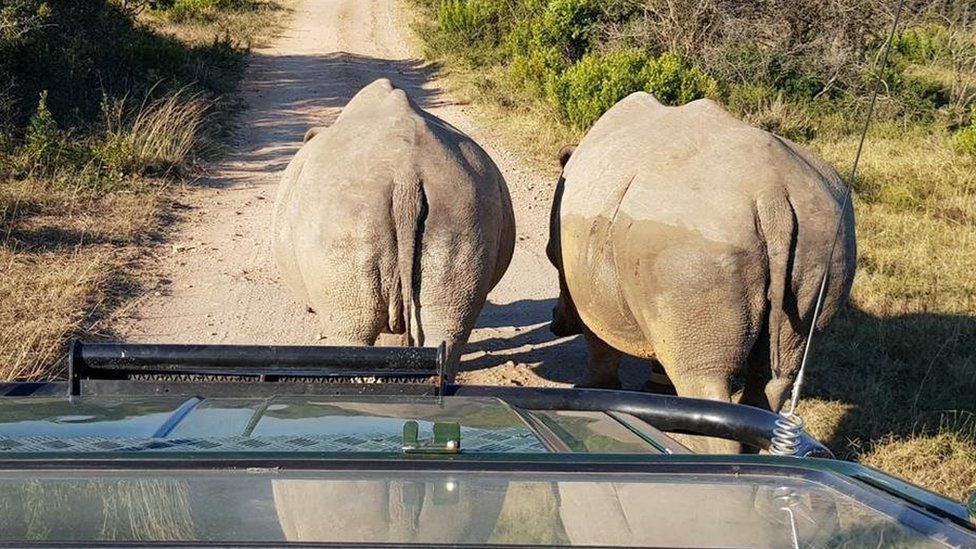
The bleeding skull and limbs of at least two poachers who broke in to hunt rhinos were discovered by staff at a South African reserve.
Poachers drawn to the Sibuya Game Reserve’s wide variety of animals, particularly its rhinos, have committed multiple intrusions there over the past several years. The reserve is located in southeast South Africa, close to the town of Kenton-on-Sea.
The corpses of two, probably three, alleged rhino poachers who were mauled to death and devoured by the neighborhood lions in what some are calling an act of nature’s karma were found by rangers in a lion cage inside the reserve.
Owner of the park Nick Fox said that there were so few of the poacher’s corpses left that it was impossible for authorities to determine how many individuals were actually killed.
The only parts of the corpse that were still there were one skull and a little portion of the pelvis, according to Fox.
However, given that most rhino poaching gangs consist of three individuals and that three pairs of shoes and gloves were discovered nearby, game reserve personnel believe that we are talking about three males.

Sibuya, a 30-square-mile reserve in the Eastern Cape region of South Africa, is home to all five species of the “Big 5” (lions, rhinoceroses, elephants, buffaloes, and leopards).
The reserve’s anti-poaching canines alerted staff to a problem about 4:30 a.m. on July 2, according to Fox. The dog handler then heard a commotion coming from the lions but chose not to investigate because it was how the lions often acted in the morning.
One of the reserve’s rangers didn’t discover the bloody corpses of the poachers until much later. A high-powered rifle with a silencer, an ax, and wire cutters were among the equipment that the police and Sibuya staff discovered when they got on the site. According to Fox, this is a “surefire indicator of rhino poachers.”
A helicopter search team was unable to locate any survivors. The precise number of individuals devoured is another question the police are investigating.
According to Fox, “we recovered enough body pieces and three pairs of empty shoes to imply that the lions ate at least three of them, but it is dense bush and there might be more.”

Due to the rising demand for rhino horn in some regions of Asia, there has been an increase in poaching in Africa in recent years. 1,028 rhinos were poached in South Africa in 2017, according to the Department of Environmental Affairs of South Africa.
Despite being made of the same substance as human fingernails, rhino horns are in high demand in Southeast Asia, notably Vietnam, due to the mistaken belief that they have potent medical capabilities. In certain regions, rhino horns may sell for up to $100,000 per kilogram (a little over two pounds), providing poachers with a substantial incentive.
While the occurrence was unfortunate, Fox felt it should serve as a warning to other poachers who put themselves in danger by illegally shooting wildlife on his reserve. He stated of the poachers, “The lions are our watches and protectors and they selected the wrong pride and became a meal.”
Around 29,000 rhinos are still alive today, and South Africa is where most of them are found.

Karma by the wildlife !
I hope none of the lions got sick from eating the trash
Well said.
Totally 😁 agree. Well done 👍 lions
Good for the Lions! They did their bit to stop Rhino poaching.
Can’t say I have any sympathy for them. They got what they deserved.
Good
Good kitties.
How wonderful that Karma has struck so successfully.
Bon Appétit
This is nature’s payback for doing bad things. Hopefully future hunters will warned and obey the law!!!
You go Lion Pride!!! Hope you don’t get sick.
Karma Well done lions.
Good job lionesses! Karma at its best!
What goes around comes around! they knew the risks when they entered the reserve – the rule of the jungle applies.
Well done Kitties 🐱
you better brlieve it. those bastards got what they deserved.
These people should start collecting finger nail clippings and get done with these horrid practices. Tragic. At least this lot won’t do it again…..
Great news let’s hope it happens more
Although the practice of hunting poachers is legal in that area, I do not condone that particular practice, however, in this particular instance, this is natures karma coming back around. I think the purposeful taking of a human life is reprehensible, this does not fall into that category at all. Good for you nature, take back what if yours….
The rarity of horns and tusks increases their value. Rather than destroy the confiscated tusks and horns why not flood the market with them ? The animals are no longer alive either way and the monetary reward should diminish enough to discourage such a risk to the poachers. Monetary reward is the driving factor behind their behavior.
It is easy to not tolerate this behaviour, but if you lived in a poor area in Africa with a family and had to put bread on the table and no other work was to be found I too would perhaps poach to keep my family alive. Surely human life is more important . For those who do it for sport or greed than find employment elsewhere then they may learn the hard way. We are so quick to judge those around us. Especialy when we have food all around us at our finger tips.
Well done lion and lionesses
Eat Fresh !
I think we are all in agreement
Lions are really the kings —they protect their subjects. Well done!
I hope these lions are well contained again. Man eaters can’t tell a poacher from another human who could be prey. While poaching is reprehensible lions eating people isn’t much better.
It surprises me that the poachers didn’t shoot the lions. Maybe they were sleeping when they were killed.
Why don’t refuges dehorn it’s rhinos? The incentive for killing them would be gone.
Same with elephant tusks.
It won’t help the gorillas whose hands are what people want.
Even domestic animals are becoming extinct and there are no protections for them at all.
Too many people, too much grass fed beef so if we keep this up without making changes we all might become extinct.
Hope you all enjoyed your fresh meal, and well done to all you lions 👍😍❤️
This is the well known result of karma which means action: unwholesome action brings suffering!